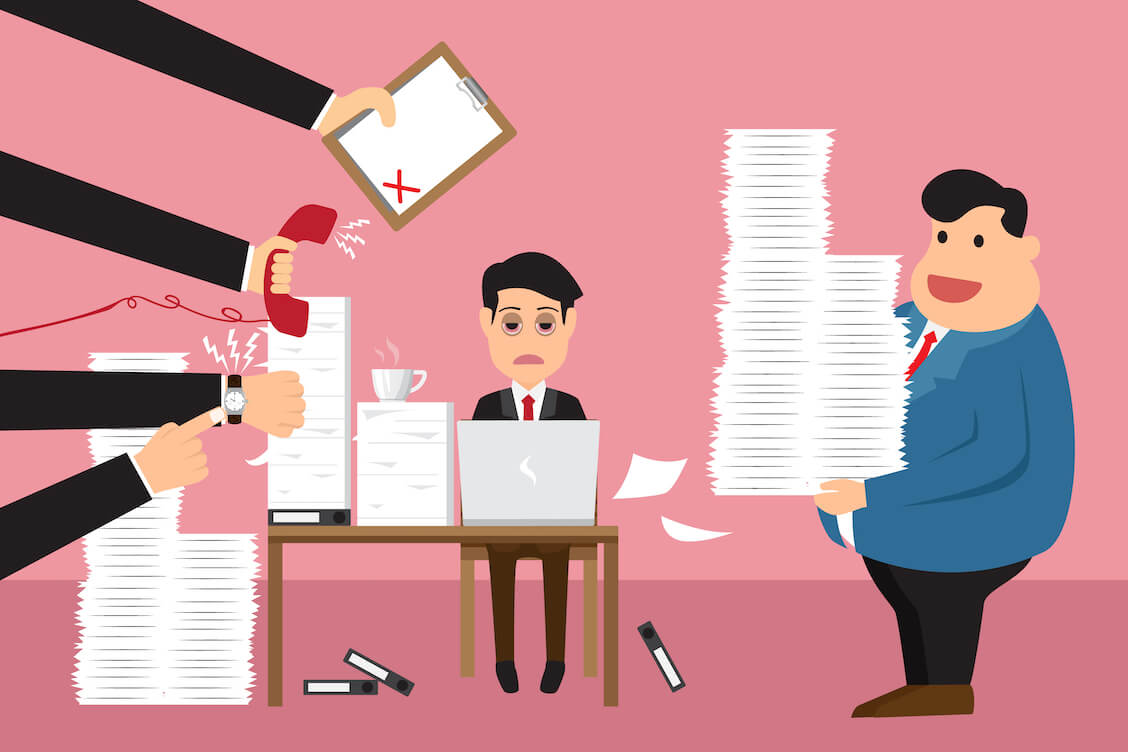
Balancing time and mental energy is one of the secrets to having an effective work life. When your employees are unable to achieve this balance, they begin to struggle with their workloads. This is bad as it leads to stress and has negative implications for employee health. It also reduces workplace productivity. Knowing this, we have outlined various ways through which you can help your employees effectively handle the problem of a heavy workload.
What Is a Heavy Workload?
A heavy workload has to do with how much work a person is tasked with doing. Typically, this amount of work is measured in units of time and intensity. In this way, a person is said to have a heavy workload when they have to work for long hours at a stretch.
Heavy workloads are also measured in how much a person is working compared to their normal limits. These limits could be the range of their work duties or their respective capabilities. When there is an overdraft, the person is said to be overworked.
Symptoms of a Heavy Workload
1. Barely Meeting Deadlines
Time is the biggest indicator of a heavy workload. When your employees are having issues working around deadlines, the workload is likely heavy. The more work they do within the prescribed time, the heavier the workload. And if diligent employees are missing deadlines consecutively, the workload is heavy.
2. Constant Stress
After the time element, stress is the best pointer for burdensome work. You can even think of stress as a naturally occurring effect of having to work within specified time limits. In other words, your employees may be stressed because they are dealing with too many tasks at the same time or have too little time to complete all your assigned tasks. In either case, a heavy workload is to blame.
3. Poor Mental Health
Heavy workloads and overworking are synonymous. The higher the need to overwork, the greater the strains on the mind. The result of this attitude to work is poor mental health. With poor mental health, employees lose their tempers easily and have issues controlling their emotions.
4. Inability to Maintain Personal Relationships
Preoccupation with work is usually a good thing. But with heavy workloads, this preoccupation crushes out everything that is not related to work. Employees dealing with heavy workloads begin to lose personal relationships as these become difficult to maintain. Even relating to workmates can become an issue considering that overworked employees have little time to relax and unwind.
5. Poor Physical Health
Employees dealing with heavy workloads also suffer from poor physical health. From their appearance, it is easy to tell that they need to rest. They could appear gaunt with bones looking like they want to jump out of their bodies. All of this is because excessive workloads put as much strain on the physical body as it does on the mind.
6. Changing Sleep Patterns
For every minute an employee works longer than normal, the odds of their being overworked increase. The body has a natural clock that lets it know when to sleep. When employees work around looking like they are drowsy, it is because that clock has been messed up. More times than not, severe workloads are to blame.
7. Appetite Problems
Food is an important component of human life. It is very easy to tell whether or not your employees are overworked and struggling with their workloads. Just check to see if they are eating regularly and eating balanced diets. If not, the workload is too much. And if employees have appetite issues, this is an indicator that they are dealing with heavy workloads.
8. Memory Lags
The mind is an interesting thing. Sometimes, it grows stronger and sharper from being stressed. Other times, it flops. Every time, heavy workloads make the mind flop, resulting in memory lags. Thus, employees struggling with their workloads also struggle with remembering things.
9. Inattentiveness
With failing memories, inconsistent sleep patterns, and the other symptoms of overworking so far identified, employees generally become inattentive. Excessive workloads make the mind wander easily, leaving your employees absent-minded and easily distracted. So, inattentive employees and daydreaming employees belong in the same class as overworked employees.
9. Growing Ineffectiveness
Employees struggling with their workload are usually ineffective. All the recognized symptoms of excessive workloads are to blame for this. The heavier the workload of an employee, the easier they would fail to deliver on assigned tasks.
How to Manage a Heavy Workload Effectively?
Here are a bunch of things you can do to help your employees handle their workloads.
1. Track Time
Time is the dominant component in the workplace. Being overworked is usually an indicator of faulty time management. So, if you want to help your employees handle heavy workloads, you have to make them track how much time they spend doing anything. This makes it easier for them to schedule tasks sensibly.
Automated time tracking is a convenience in the modern workplace. With time-tracking software options like Traqq, your employees would be able to manage time more effectively. The earlier you use this tracker, the easier your employees can handle their tasks. They would no longer feel as though time is against them because time tracking would lend them more control over time.
2. Set Reasonable Deadlines
A deadline is easily one of the best motivations for good work. Efficient work is measured by how much time you and your employees can save. This is what deadlines are for: they help put tasks in perspective, letting your employees know how important delivering on a task is. So, deadlines are good indicators of the value you have assigned to task completion.
You have to put a lot of thought into setting deadlines for your employees. Even knowing that the tasks are important, you have to make sure that your employees can deliver on time. They should also have enough time to spare for possible reviews and adjustments.
3. Encourage a Healthy Work-Life
Striking a balance between the demands of the workplace and the demands of their personal lives is a good way to help employees handle heavy workloads. Such a balance is achieved when a person lets everything have its proper place. This also makes time management less complicated for your employees, the result of which is an increased mastery of the task delivery process.
So, encourage your employees to have a healthy work-life. Adhere to a strict policy of when to work and when to take a break. This will reduce the odds of burnout and improve employee performance over time.
4. Use Digital Technology and Automate Work Processes
Digital transformation is a trending concept. The internet is the treasure land of amazing software applications that do almost everything. Use this to your advantage and encourage process automation in your workplace. A responsible use of software for automation has good prospects for performance as it can help you and your employees save time, increase boost process effectiveness, and simply do more work.
We mentioned Traqq as a way to automate time. ChatGPT is another trending technology you should check out to ease the workloads of your employees.
5. Adopt Transformational Leadership
Without a doubt, workload quality and impact depend on workplace leadership and employee management. If you manage your employees well, their workloads would no longer be a problem. So, using effective leadership is one of the best and easiest solutions for overworking, heavy workloads, and burnout in the workplace.
Transformational leadership is compatible with healthy workplace practices. By focusing on inspiring and motivating your employees instead of simply ordering them around, they will be easier to manage, guide, and lead. Influencing them will no longer be a problem. Thus, your workplace would become a space for less stress, good work, and high productivity.
Use this quiz to identify the type of leader that aligns with your characteristics.
Effects of Heavy Workload on Employees and the Workplace
1. Low Productivity and Performance
The leading effect of a heavy workload on workplace dynamics is low productivity. This can take the form of employees constantly failing to meet deadlines or delivering shoddy work. Furthermore, employee productivity will continue to fall, resulting in very poor performance in your workplace.
2. Poor Employee Engagement
Constant burnouts also lead to poor employee engagement. The heavier the workloads that your employees struggle with, the less time they would have to engage harmoniously with others. As a result, even you may find it impossible to manage your employees productively.
4. Ineffective Teamwork
Poor employee engagement is closely related to ineffective teamwork. Teams are made up of individual people, so individual inadequacies reflect on the team. In the case of overworking, the higher the number of employees that are unable to handle their workload, the greater the threat they pose to effective teamwork. In such cases, teams become units for employee grievance and resentment.
5. Tensions in the Workplace
If you don’t help your employees handle their workloads effectively, there will be tensions in your workplace. With your employees stressed out and mentally unsettled, they would easily lose control of their emotions. Composure and calm would be thrown out of the window, and commotion would become the order of the day.
6. Unfavorable Organizational Ratings
At present, employee management is an important variable for appraising organizational culture. Considering the cited risks of letting employees struggle with heavy workloads, your workplace can gain a negative reputation for being insensitive. This will lead to your organization getting unfavorable ratings from the public and it will jeopardize future opportunities for company growth.
Conclusion
A heavy workload has significant negative implications for employee engagement and workplace productivity. Effective workload management might cause you to adopt a different management style at your workplace or the use of automation. But it positively affects the health and happiness of your employees along with workplace productivity in the long term.
FAQ
How to Deal with an Employee Struggling with a Heavy Workload?
- Set reasonable deadlines for the employee and create a hierarchy of task priority for them.
- Stick to a strict schedule for work and rest, thereby reducing the risks of overworking and burnout.
- Create relaxation spaces in your workplace where employees can sleep, play games, and engage in activities outside their task routines.
How to Help Employees Manage Stress from a Heavy Workload?
- Balance the demands of the workplace with the important activities of personal life.
- Emphasize employee health and bring in experts that educate employees on how to be effective in their work without overworking.
- Organize recreational activities for employees.
What Time Management Strategies Can Help Reduce Employee Workload?
- Time tracking: Monitor the time allotted to tasks and make sure that your employees adhere to these timeframes.
- Employee-task matching: Delegate tasks based on the capacity of your employees.
- Automation: Use software applications to automate tasks, thereby increasing employee effectiveness and reducing their need to overwork.
- Routine establishment: Establish a routine for task delivery so that your employees can easily and successfully adapt to the process.


